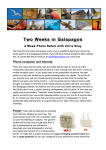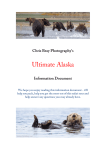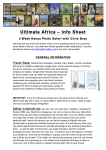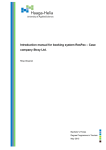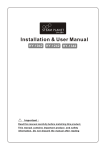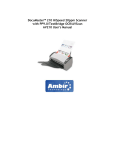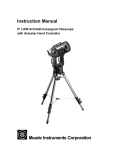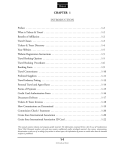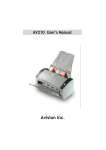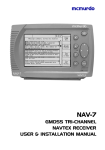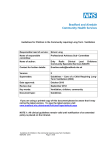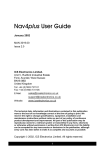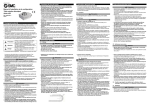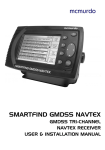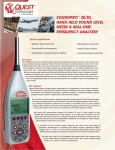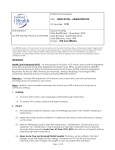Download Patagonia Safari - Information
Transcript
Two Weeks in Perfect Patagonia 2 Week Photo Safari with Chris Bray Photography We hope this document will answer many of your questions about your upcoming photo safari to Patagonia. If you still have further questions after reading this, of course feel free to email us at [email protected] Phone Reception & Internet: Free wireless Internet will be available at the restaurants attached to some of our accommodations, and so while you shouldn’t have a problem keeping in touch via Email, I wouldn’t plan on accessing it every day. As far as mobile reception goes – if you really need to be contactable via phone, the best option is to set your mobile up for global roaming before you depart. To do this all you need to do is call your mobile service provider and ask them to turn it on before you leave your home country. It might not be a bad idea to re-record your voice-mail message before you go too, just so if anyone does try to contact you, they know that your busy having fun in Patagonia! To avoid substantial data roaming fees, it’s a good idea to turn ‘data’ off on your phone when overseas, and keep calls short. Power / Electricity: There will be electricity to recharge your cameras, laptops etc each day. The mains power plug is the same as the Australian one. The general routine will be that once we get back from a morning or afternoon’s photography, you will want to download your new photographs, and put your laptop and camera on to charge. To make this a quicker process we suggest bringing a power board that has a surge protector inbuilt so you can charge all of your electronics at the same time. Surge Protectors are a very good idea when traveling overseas. While we’ve not had any bad experiences, a blackout would not be surprising, and so using a surge protector when charging things like a laptop will help prevent any electricity spikes damaging your electronics. Language: Spanish is the national language of Argentina. We will have local guides on the trip that will speak Spanish as well as English. Even still, you may enjoy bringing a small pocket phrase book to learn some local words. Here are some common words and phrases to get you started: Thank you = Gracias Yes = Si No = No Hello = Hola Please = Por favor Medical Information: Closer to departure we will email you a medical information form that we will ask you to fill in and email back to us. It’s not that we’re personally interested in what medication you take, but if you are involved in an accident and end up in hospital for some reason – we would need this information on hand to give to the doctors. So please fill the medical form honestly and openly, with this in mind. Sea Sickness: There are a few boat trips involved with this safari, so if you know you get sea sick easily, then remember to pack some anti-sea-sickness tablets, ginger, pressure bands or whatever it is that you find works for you! (By the way, when I go sailing, I use ‘15mg Stugeron tablets’ which I buy online from Canada – seems to be the only stuff that works for me, and Jess uses transdermscop (scopolamine 1.5) patches – the benefit of these being you don’t loose the medication if you do become sick, but they are quite serious drugs, and we’re using them for sailing through some of the roughest oceans in the world in a very small boat – on this safari it’s mostly all within a big bay which is usually very calm). Immunizations: There are several nasties that you will want to be immunised against in Patagonia. Obviously Jess and I are not doctors and so it’s best to consult your travel doctor and work out what immunizations are best for you, however after doing some research and discussing with our doctor, below is a starting point: • • • Hepatitis A injection - (last’s a life time) definitely worth getting! Many of you may already have this. A Tetanus injection - is also worth getting (they last about 10 years so check when you last had a booster shot), and in Australia the Tetanus shot is free and also contains a Dyptheria immuniser in the single injection! Yay – less needles! Diphtheria & pertussis vaccines can be added to the tetanus vaccine. Because many adults no longer have immunity from childhood vaccination, travellers to less developed countries are advised to have a tetanus, diphtheria & pertussis booster. And just for the plane flights etc, it might not be a bad idea to have the latest influenza vaccine injection too – it’d be devastating if you were too sick to enjoy the experience just because you caught the flu on the way over! Travel Insurance: Chris Bray Photography will not be liable for any damage to your camera equipment, nor your personal health or wellbeing. We require that you take out travellers insurance for these two weeks, not only will this cover you and your gear, but if you needed to pull out at the last minute, you should be able to get a refund from the insurance company, which is great! (Remember we have a wonderfully friendly travel agent Jacqui working for us who is more than happy to help find you the best deal). Suggest things to bring: • • • • • • • • • • • • • • • • • • Clothes (Obviously, but see detailed ‘clothing’ section below) Raincoat (just in case). Sturdy comfortable closed in walking shoes and a pair of sandals or thongs. Head torch / torch Sunscreen Sunglasses (polarized will be best!) Lip moisturiser with Sunscreen i.e. Blistex Travel alarm clock (or smart Phone!) Personal medication (if applicable) Camera backpack /daypack – something big enough to carry all your camera gear in and a rain jacket etc – ideally a sturdy brand like Lowepro! Tripod (we’ll try for some star trails, painting with light etc) Happy snap camera, or even a GoPro camera – optional. Snap lock bags (for easy rainproofing camera gear) Spare camera batteries - Even though you will be able to recharge your battery each night, it’s not a bad idea to carry a spare, in case there is a blackout and you can’t recharge, or, more likely, if you take so many photos some days that you’ll run out of your main battery mid-shoot! Plenty of memory cards to store your pictures on, perhaps even a portable harddrive and laptop to back them up onto. There are ‘portable media storage devices’ that download from your card to inbuilt hard drive automatically for you, however we do not recommend these devices as we have seen too many fail. You will enjoy having a laptop with you as it enables you to see (and learn from) your photos as you go, tweak a few, put them online etc. Something like a MacBook Air is ideal, more useful than an iPad. Your camera’s user manual – just in case even we really can’t work something out on your camera! Camera sensor cleaning equipment such as an airblower (optional – at your own risk). And last but not least, don’t forget your camera and lenses (ideally with UV/lens protectors on the front of each), filters (polarizing filters might be great to have, especially for wide angle lenses). Clothing: You will need some comfortable, lightweight ‘Safari clothes’ to allow for ease of mobility (to get down low for interesting shots, to climb in and out of boats etc). Pockets are useful for things like lens-caps, lens cloths etc. Long-sleeves (and fulllength pants) will help keep the sun off and are a great, practical idea. You’ll find that your main clothes will be a couple of lightweight, loose pairs of full-length safari pants or shorts, and similarly loose, breathable tops. It would be ideal if these clothes were naturally earthy, pastel colours – we don’t want to frighten the animals! Don’t forget to bring a few warm layers like an Icebreaker base layers, a fleece, and a raincoat too. It gets really cold during the early mornings (when we are waking up and getting ready to photograph) it can be between 5 and 10 degrees in the morning and can reach to a maximum of 22 degrees Celsius during the ‘heat’ of the day. So be prepared to layer up!! You might also want to bring something smart-casual to wear for dinner on some nights when you’re sick of living in your safari gear and have enough time to change, but remember we’re here to see things, not be seen! =) Remember less is more! Think long and hard about what gear to take, as you don’t want to be lugging too much stuff around! The safari vehicle has limited storage capacity. And last but not least, don’t forget a hat! Make sure it’s a wide-brimmed hat – and ideally without too stiff a brim (and certainly not a peaked baseball cap) as these stiff brims get in the way when you try and hold your camera up to your face. A drawcord on your hat is not a bad idea either as it can get a bit windy on the boats! Washing: Don’t worry, you wont have to bring 14 shirts, and 14 pairs of undies!!! You can do washing, or have it done, at the various places we go to. There are laundry’s in the villages we stay at for the first week-ish and the last week-ish. Safety in Patagonia: In general, crime is not a problem in the Patagonia, so there is little to be concerned about. Pre and post trip, you’ll need to take care when travelling in the main cities, especially places like Bones Aries, watch your camera very carefully, and always have it strapped around you. Don’t take chances! Checked-in Baggage: The general rule for traveling anywhere should always be that (as much as possible), bring all your critically important stuff with you as carryon luggage (this includes camera chargers etc – anything that would ruin your safari completely if it was stolen or if your main baggage was delayed etc. Unlikely of course, but it provides peace of mind if you carry your genuine ‘essentials’ with you). Money: The currency in Argentina is the Argentine Peso (ARS). It’s best to use a credit card at an ATM when you need some cash, there will be ATM’s at the first and last village that we visit. It’s a very cash-based society and credit cards & travellers cheques are not widely accepted as day-to-day payment. Don’t for get to let your bank know that you will be overseas for two weeks – if your bank is unaware that your in Argentina they might suspend your credit card the first time you try to use it, making it very hard to get any money out at all. Luggage Bag: It’s always best to bring your non-camera gear (clothes etc) in a soft bag such as a duffle-bag or backpack (with wheels might make it easier) - please don’t bring a hard suitcase, as they are awkward to stash away. You need to be comfortable carrying your own luggage – so pack light! We have very limited space for luggage in the Safari vehicle so please only one check-in size bag per person! Flight Information & Connections: We strongly suggest you book your flights through our recommended travel agent Jacqui Smith [email protected]. If you chose to book your own flights, please email me your suggested flight itinerary before you book. In summary, we strongly recommend that you fly into Trelew Airport in the afternoon/evening on the first day of the safari on the flight listed below. There is no point arriving in Trelew the day before the safari starts because there is not much to do in Trelew and the town is a long way from the airport, if you want to overnight somewhere to break up the long flights, perhaps over night in Bones Aries. You will need to fly out of Comodoro Rivadavia Airport on the morning on the last day of the safari – Jess and I will be leaving on the last day of the safari too (to head direct to Galapagos to start the next safari!) so this is the only day that we will be offering airport transfers, our accommodation is about 4hrs drive from the airport so it will be a very early start unfortunately, but I’m sure you can sleep while we drive! These are the flights that you will need to be booked on: Saturday 26th of October 2013 with Aerolineas Argentinas – AR 2866 Aircraft: Embraer 190 Departure: 19:30 Buenos Aires, Argentina Arrival: 21:30 Trelew, Argentinas Saturday the 9th of November 2013 – with Aerolineas Argentinas – AR 1833 Aircraft: Boeing 737-800 Departure: 8:35am Comodoro Rivadavi, Argentina Arrival: 10:46am Buenos Aires, Argentina Argentinean Government “Reciprocity Fee” The Argentinean Government has introduced a “Reciprocity Fee/Rate” costing USD100 which needs to be obtained before arrival and can be done at the following website http://www.migraciones.gov.ar/ (click the USA flag for English version, then scroll down to find the Reciprocity Rate link). Without this you will be refused entry into Argentina! CAMERA GEAR Where to begin… What Lenses to bring: In an ideal world you’d want a good wide angle zoom lens for landscape shots, a standard-ish zoom lens (wide-ish to zoomed-in-ish) for the ‘every day’ kind of shots, and a fairly serious telephoto lens (probably also a zoom) for all the wildlife shots. However, you DO NOT NEED TO GO AND SPEND A FORTUNE ON LENSES to get amazing photos! We get very close to most of the animals in Patagonia. Even something like a twin lens kit (wide-to-normal, and normal-to-telephoto) will cover your bases, however, some animals are small (especially birds) and some are harder to get close to, so a good long telephoto lens up to say 300mm or ideally even 400mm will sometimes make the difference between a good photo and an amazing photo. So if you are thinking of buying one special lens for this trip, make it a telephoto zoom lens, and, if you’re tossing up between spending some $’s upgrading the body of your camera or buying a telephoto lens instead – buy the telephoto lens!!! I have written down a few suggested lenses below, the specs and the RRP – please note the RRP is from Digital Camera Warehouse – and prices do vary between different stores, so shop around. Also keep in mind that there is nothing wrong with getting a good second-hand lens from e-bay (assuming its in good condition!). If you have other creative lenses like macro lenses or fisheye lenses, bring them along as well, it’s always fun to have a play with different angles. Wide-angle Lenses - for Canon Cameras: Canon EF-S 10-22mm 1:3.5-4.5, RRP $939 (Great very wide lens for ‘sub-frame’ cameras – that’s basically any camera except the 1D series or the 5D mk II!) Canon 17-40mm 1:4 L USM, RRP $949. Canon 16-35mm 1:2.8 L USM, RRP $1,929 (My favourite) Standard Lenses - You wont be using a standard lens that much, so to be honest, whatever came with your camera will probably be fine. But if you are in the market for an upgrade you really can’t go past the Canon 24-105mm USM IS L 1:4 – My favourite all-rounder / workhorse lens. Telephoto Lenses – Most of what we will be shooting will benefit from a good long telephoto lens, the ideal focal length you would want to totally maximise your experience in Patagoniais 400mm. However that’s not to say that you wont get awesome shots on most subjects even with a 300mm if that’s all you have. I’d hesitate against using anything shorter than 300mm though as your longest lens. The ideal wildlife lens that we recommend is: Canon 100-400mm EF 1:4.5-5.6 IS USM L, RRP (DCW) $1,999 You will be able to pick one of these beauties up for about $1,400 on e-bay at the moment, but they might not come with an Australian warranty. But this lens will give you superbly sharp and zoomed-in, big full-frame shots, and its image stabilisation is great. Remember the longer the lens, the more important it is to have image stabilisation. The other seriously long telephoto lens (which is a little cheaper than Canon’s 100400mm) is the Sigma 150-500mm 1:5-6.3 DG OS HSM, RRP $1,200. Now, this lens is great for those who can’t afford the Canon telephoto lens - it goes to a whopping 500mm, which is fantastic, but unfortunately it’s not as fast (not as small an f/#), the ‘OS’ (optical stabilization) does not work as well as on the Canon lens, and the images don’t tend to be quite as sharp. But yet, you get what you pay for, and this is certainly still a superb lens and great value for money Tele-extenders - Tele-extenders are affordable little ‘spacer lenses’ that go between your camera and your telephoto lens to make the lens longer – to ‘extend’ the focal length of your longest lens. You can get various sizes, but commonly you can get a 1.4x extender, or a 2x extender that will multiply the focal length of the attached lens by 1.4x and 2x respectively. So a 2x tele extender on a 100-400mm lens turns it into a 200-800mm epic lens! However, there is a catch. 1. You may loose a little image clarity, 2. You won’t be able to scroll down to such small f/#’s anymore as tele extenders ‘reduce the maximum effective aperture’ of the lens, and, 3. You may LOOSE THE ABILITY TO AUTOFOCUS your lens! You've got to be very careful with tele-extenders and Auto-Focus (AF). My understanding is: For AF to work, the 'max effective aperture' of the lens & extender combined must be at least f/5.6 (or a slightly more tolerant f/8 for pro 1D series cameras). The 2x tele extender reduces the max effective aperture by '2 stops' (F# scale increasing by 1 stop at a time goes like this: f/1.4, f/2, f/2.8, f/4, f/5.6, f/8) So for the 2x tele to work on a normal camera, the lens you’re attaching it to would need to be a f/2.8 lens or faster (ie, bloody fast & expensive), but the 1.4x tele extender only reduces the f-stop by 1 stop, so you could get AF with a lens f/4 or faster (as it will ‘become’ an f/5.6 or faster). SO – I usually recommend people if they want a teleextender to go for the 1.4x tele, else many of your lenses won't AF anymore (unless you have a damn expensive fast lens), which can be a big pain. You DON’T NEED a tele-extender for the Patagonia trip, but it is a good tool to pull out to give you that little bit more reach sometimes if you have one. Keep in mind that you can always borrow camera equipment from hire places in Australia – so if you’re not interested in purchasing your own, perhaps look into how much it would cost to hire. Remember though that if your longest telephoto lens is only an f/5.6 lens, then even if you just use a 1.4x tele, you still wont be able to AF (not that manual focus is impossible to use, it just slows you down a lot!) Camera Body: Again, it’s more important to have a good telephoto lens than a brand new camera body, however if you are looking to upgrade your camera body, here are some simple guides. If you don’t own a camera yet, and are only looking at an entry level camera, then the Canon 650D or 60D are great (and record HD video too, as do the others we will now look at!). Looking at the mid-range ‘enthusiast’ level cameras which the majority of safari travellers will be using, currently I’d say the best ones to look at in increasing order of price and awesomeness are the Canon EOS 60D, then the 7D. Up from there you get into full-frame cameras including the 6D and the 5D mk III, both amazing cameras – but realise that with a full-frame camera your lenses don’t seem as zoomed in: Sub frame cameras make your lenses seem about 1.6x more zoomed in which can be great for wildlife, so don’t fall for the trap of thinking that a full-frame is always going to be better for you. Think long and hard between a 5D mk II and a 7D – I’d go the 7D for various reasons (the fact it’s not full-frame is actually a good thing for wildlife shooting, as we just said), the 7D also has an in built flash, can take up to 8 pics/sec in burst mode (for when the sea-eagle swoops and snatches up the fish from the lake!) compared to 3.9 pics/sec of the 5D mk II etc. The 5D mk III though blows the 7D out of the water. After the 7D/6D,5D’s, well, if you want to step into the professional range of cameras, then you’re looking at the Canon 1D mk IV or a 1D X. If you are looking at up-grading your canon body, feel free to shoot us and email at [email protected] and we an help you out. Remember that Jess and I don’t make a cut out of what you end up purchasing, or have stock we’re tying to sell-off, unlike the guys at some camera stores . Bringing Multiple Cameras: If you happen to have two cameras (don’t worry if you don’t, it’s kinda a bit excessive!), some people find it great to bring them both, with a long lens attached to one, and a wide lens attached to the other – this means that you don’t have to change lenses so much, it’s faster, and also provides redundancy/backup should your camera fail. (Unlikely – and we’ll bring a few spare Canon 600D’s with us just incase any of your cameras do die). If you have a little compact ‘point-andshoot’ camera for your pocket, that might come in handy too! Again, if you only have one camera that’s totally fine! Memory Cards & File Storage: While you should certainly be practicing restraint and only taking photos that are worth taking, you’ll still need LOTS of memory cards and it might also be a great idea to bring some kind of data backup system. A laptop with an external hard drive is good, as with the laptop you have the big advantage that you can look at your photos each night, see how they turned out, learn from them, tweak them, put them online etc, but has the disadvantage of being heavy and delicate to bring, and just one more thing to keep charged! If at all possible though, you will really appreciate having a small laptop with you – a MacBook Air would be ideal, and more useful than an iPad! Another option is using a ‘portable media storage device’ like a ‘Wolverine PicPac II – 320 GB Digital Camera Backup System’ that is basically a hard drive and a card-reader built into one, that just sucks off the photos from your card onto it’s inbuilt hard drive, without the need for a laptop. These are good in theory, however you can’t see your photos very well, and not at all on some of them, and you will want to learn how they work before you leave! To be honest, we do not recommend these devices as they are confusing, and we have had several of them fail on safaris. Some people simply opt to bring enough spare memory cards that they don’t even need to copy them onto anything – you’ll just have to get good (and ruthless) about deleting your less-good photos every evening, just by peering at them on the back of your camera – which is hard! As a ballpark figure, you will need anywhere from 30GB to 50 GB of storage space for the two weeks, assuming you’re shooting in highest quality JPEG mode. If you’re shooting in RAW mode, or additionally shooting large amounts of HD video, then you might need more storage, perhaps up to a whopping 200GB if you’re totally crazy. To avoid the risk of loosing your images if a memory card fails or something, you should try to always keep two copies of your photographs. For example I use a laptop and two identical external hard drives, and each evening I download my photos onto the first one drive, then copy them additionally to the second one, before deleting/formatting the memory card - just in case! Dust & Camera Gear: Changing lens out on safari can be a challenge – Perhaps invest in a ‘Rocket blower’ (hand-held air puffer) to carefully blow any such dust/grit off your sensor (but of course you only attempt this in a nice clean room). OTHER GENERAL POINTS TO NOTE: • • • The exact order of the itinerary above may be shuffled around and tweaked due to weather etc but you can rest assured that we'll be working flat-out to get you to all the best places, for the best photos possible. The accommodation available to us in Patagonia is not luxury (though when we stay in chalets they are beautiful!). All accommodation is perfectly functional and clean - there's hot water, electricity, comfy beds etc - but it's not the Ritz or the Hilton ok! However, we won’t be spending much time in our rooms anyway - just to sleep! Some of the villages we are staying at are quite isolated and do not have many tourists therefore there are actually no extravagant 5-star accommodation available. Wireless Internet will be available for free at the Paradise Hotel where we stay for the first week, paid wireless at the Indallo Inn stopover, and again at the Chalets (however there is free wireless down the road in the Dolphin Center). • • • • • • • • • • • We will form our own private group – while there will be some locations where we share a common dining space etc with others, when out and about we will have our own guide, and all boat trips and daytrips are private and will be just us and our guide. Most meals are not included with the exception of the feast on day 12 and a few other occasions, so all other meals and beverages must be purchased at your own expense. This frees you up to spend as much or as little as you wish on dinners etc at each venue. As an approx guide, expect $10-$20 US for a good steak or seafood main, beer is about $1.50 - $2.50 for a big 1 L bottle, and a bottle of wine about $15+ bottle. Accommodation arrangements vary for each location, however it is all twin-share. So, if you're booking on your own, then expect to share a room with someone else, and if you're booking as a couple, then we can organise a double bed rather than two singles - just let us know. For solo travellers we can’t guarantee that we’ll always be able to have you sharing with someone of the same sex – it depends on the gender split, but we do our best! If you require a room to yourself, we can investigate which locations we can organise you a single-supplement at an extra fee, but on all our past safaris, the rare occasions when people have organised single rooms, they have said they regretted it once on safari, feeling lonely when looking at all the amazing friendships that spring up between other roomies. We have far more people traveling alone than together. When we stay in the gorgeous private Chalets from Day 11 to 15, each Chalet has two bedrooms (therefore, two people in each room so four people to a Chalet) a bathroom, kitchen and lounge room. Patagonia is a big place, and when we shift our base, there'll be some driving - one day in particular (Day 9) is almost 7 hours of driving when we relocate to the chalets. It evens out though, as we stay in the same place for the first week, and once we reach the chalets, we stay there for the remainder of the trip. Level of fitness - Moderate. You do need to be able to get in and out of boats, and survive a morning or afternoon walking around taking photos carrying your camera bag on your back, negotiate rocky terrain etc. This is Patagonia we're going to - there may be occasional power outages etc, but it's all part of the experience, and I'm sure you'll survive. The price does NOT include flights from your home town to Trelew (Argentina), nor your return flight back home from Commodoro Rivadavia (Argentina). However, flights from Sydney to Buenos Aires (Argentina) average around $2,500 return but if you book early you can get them for more like $1,800. We have our own travel agent who is more than happy to help answer all your questions and help you find and book the best flights, travel insurance etc. We do not loan out our own camera equipment for this trip. We will bring a spare camera or two just incase but be prepared to be fully self sufficient regarding your camera gear, tripods etc. You MUST obtain your own travel insurance, but again, our travel agent can help you with this. A non-refundable $1,000 deposit is required at time of booking to reserve your place. The rest of the payments are split over various payment deadlines, all of which become non-refundable if you pull out after a given payment date, except for the last sizeable chunk which is refundable, unless you cancel within 45days prior to departure, irrespective of if we manage to fill the spot later. When making this payment please email me your flight details and a copy of your travel insurance. Other Questions? If you’ve any burning questions or uncertainties, please just let us know. Cheerio, Chris & Jess www.ChrisBray.net [email protected] Mobile: +61-(0)402-839-929











